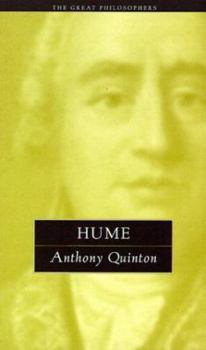Hume: The Great Philosophers
Select Format
Select Condition 
Book Overview
First published in 1999. Routledge is an imprint of Taylor & Francis, an informa company. This description may be from another edition of this product.
Format:Paperback
Language:English
ISBN:041592393X
ISBN13:9780415923934
Release Date:July 1999
Publisher:Routledge
Length:64 Pages
Weight:0.15 lbs.
Dimensions:0.2" x 4.3" x 7.1"
Customer Reviews
2 ratings
An accessible and vast overview to the vastness of Hume's thought...
Published by Thriftbooks.com User , 16 years ago
Many of Routledge's "The Great Philosophers" volumes take one or two aspects of a philosopher and develops those themes as long as 50 to 60 pages will allow. This method has pros and cons. It does allow some detail, but with a lack of comprehensiveness. Often only a brief glimpse of a philosopher appears. "Hume" takes a completely different direction. What it lacks in detail it more than makes up for in comprehensiveness. It gives a more sweeping glance at Hume's entire philosophical output, not just one or two fractions of it. Given the space provided, this represents quite an achievement in summarization. Not only that, nearly half of the book comprises passages from Hume's books. These reinforce the philosophical descriptions in the best way possible: through Hume's own words. Every major facet of Hume's thought has a dedicated section: epistemology ("Impressions" and "Ideas"), causation (we can't rationally justify it), justification of the material world (similar to causation), the idea of the self (the author disagrees with Hume on some points), Hume as "skeptic" (the author thinks this claim is overstated), morality (the "passions"), politics (Hume was not a revolutionary, a democrat or a pure liberal), and religion (posthumous dialogues against argument from design). The tiny epilogue even mentions Hume's more obscure economic and aesthetic work. The book also starts with a biography and philosophical survey of Hume's scope, influence, and contemporary depiction. Hume was an empiricist through and through. This decreased his influence in his own time, but boosted it in the 20th century. He was best known as a historian until Analytical philosophy took notice a few hundred years later. Academics up to that point had tended to dislike his methods. Thus he was ignored in philosophic circles. Now, of course, as this series more than demonstrates, Hume sits amongst the "great philosophers." Hume struggled with thinking about the world versus experiencing the world. As the section on "Scepticism" discusses, this vacillation caused Hume both misery and joy. But Hume speaks better for himself in an included passage from "Treatise of Human Nature." He describes how these "manifold contradictions and imperfections" make him "ready to reject all reasoning." As he agonizes over who, or what he or anything else is, despair seeps in. But "life" comes to the rescue: "Most fortunately it happens, that reason in incapable of dispelling these clouds, Nature herself suffices to that purpose... I dine, I play a game of backgammon, I converse, and am merry with my friends...." Following these happy distractions, Hume returns to his philosophical ruminations and finds "these speculations, they appear so cold, and strained, and ridiculous, that I cannot find in my heart to enter into them any further." Rarely do philosophers speak so candidly or directly (or movingly) of their own experience inside or outside of the "classroom." Hume bashed his head right int
Ideal introduction to Hume
Published by Thriftbooks.com User , 22 years ago
It is unfortunate that many of the other books in the Routledge Great Philosophers series do not follow the same pattern as Quinton's HUME, because this particular book is a model of what a brief introduction to a philosopher should be. Quinton offers short summaries of David Hume's life, his philosophical assumptions, and his views on causation, material things, the self, scepticism, morality and the passions, politics, and religion, with each summary followed by a list of relevant quotes from Hume's various works. Reading this book is an ideal way to orient oneself before engaging in a deeper study of Hume.






